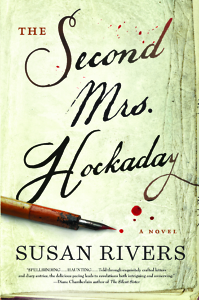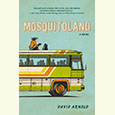They Looked Away
In The Second Mrs. Hockaday, Susan Rivers has created an original Civil War tale
The unsung heroes of war are the women who stay behind to care for families, often taking over the livelihoods of their husbands. Facing lack of training, the privations of wartime, and unexpected dangers, they’ve rarely been acknowledged for their valor. The protagonist of playwright Susan Rivers’s new novel, The Second Mrs. Hockaday, is such a heroine.

Loosely based on a real incident Rivers discovered at her local library, the novel tells the tale of Placidia Hockaday, the pampered, feisty seventeen-year-old daughter of a South Carolina plantation owner who, in the midst of the Civil War, falls in love with a widowed Confederate major. Within two days of their precipitous marriage he takes his bride to his remote farm, leaves her with his two-year-old son, and then disappears into the war again.
As the book opens, two years have passed and Placidia is writing to her cousin from jail. She is about to be tried for the death of a child she gave birth to but who was not her husband’s. And it’s her own husband who has charged her with the crime. This is the mystery at the center of the book: how did this generous, determined girl come to such a pass? And how did this man who put her in such an untenable position become her accuser?
The Second Mrs. Hockaday, an epistolary novel told entirely of letters, diary entries, and court reports, is lyrically and believably written. Rivers’s resolve not to shy away from the gritty truths of war and slavery makes us care even more for her sympathetic main character. Placidia Hockaday embodies courage and insight in the face of an unexpected ordeal, and she treats all about her with care and compassion, including the enslaved workers on her husband’s farm. While some readers might be frustrated by the novel’s secrets—what really happened to Placidia, and why won’t she tell anyone?—it’s that slow drip of truth which makes us turn the pages more quickly.
 The language throughout the book is stunningly true to its time. The dialogue, as one might expect from a playwright, is flawless. Because it is folded into letters and diaries, Rivers’s dialogue is never set within quotation marks, but the reader has no trouble hearing it spring to life.
The language throughout the book is stunningly true to its time. The dialogue, as one might expect from a playwright, is flawless. Because it is folded into letters and diaries, Rivers’s dialogue is never set within quotation marks, but the reader has no trouble hearing it spring to life.
Secondary characters round out the tale. Placidia’s selfish stepsister lives in a town not far from her but carries on an entirely different sort of existence, one populated with petty jealousies and little responsibility, untouched by the raging war. Her husband, a wealthy man, has escaped the fighting—he is one of Placidia’s protectors, a true friend, yet the juxtaposition of his comfortable life with her perilous existence cannot be ignored.
Placida’s spoiled stepbrother, Nolan, an alcoholic who respects no one and in an early scene rapes an enslaved woman, is an ugly character who gives ballast to the book and helps hone Placidia’s point of view toward slavery. When he shows up in the parlor after the rape, the knees of his white trousers stained with red dirt, she writes,
I thanked the Creator that my father was not there to see his stepson’s déshabillé. My stepmother’s face was the color of chalk and her red mouth had gone rigid, but she said nothing to Nolan, nor did any other lady in the room, including me. What could be said? Young Master Oglesby had clearly gone “hunting” out in the dark beyond the tea olives, in the small white building where our house servants lived or in the larger cabins down the hill where the smoke from the cooking pots of six families rose into the willows. Sitting in our candlelit room enjoying the Sonata in A Major we did not rebuke him. We looked away.
This scene speaks as much to the restricted place of women as it does to the white man’s power over African Americans. It’s Placidia’s future husband, the major, who finally steers the drunken rapist out of the room, to “catechize” him.
Major Hockaday is probably the most complex and confounding character in the book. In one of the opening scenes, the shy, clumsy soldier dances with Placidia, a girl he’s just met at her stepsister’s wedding: “His hands were calloused and he held me at a distance in the way Abner holds fresh coonskin –like he was fixing to nail me to a shed before the smell made his eyes water,” she notes. Not long afterward, however, he overcomes his timidity:
The major stood against the pillar with his arms crossed, watching my aunt at the piano, but there was no concealing the thread of attention that seemed to originate in his chest and stretch across the room to the hollow space at the base of my throat. It might as well have been a magnetic cord, or the fuse on a firework, snapping with sparks.
There is also a pragmatic side to the major’s interest in Placidia: the man needs a wife to help raise his orphaned son. Though the marriage begins lovingly, the major returns from the war injured in invisible ways and not averse to turning on his brave bride. It is left to their descendants to read through the letters, diary, and inquest reports to unravel the mystery—and to understand the weight of Placidia Hockaday’s horrifying secret.
Rivers has created a unique and painful spin on a war that has often been the setting of novels. It speaks to her skill that she’s able to create a cohesive, satisfying tale with diverse material and varied voices. But the epistolary format is not what’s most striking about the novel. In the end, the book burns brightly because Rivers has created in her young heroine a beacon of innate courage and moral clarity which challenges us all to locate these traits in ourselves.

Jennie Fields received an M.F.A. in creative writing from the University of Iowa Writers’ Workshop and is the author of four novels: The Age of Desire, Lily Beach, Crossing Brooklyn Ferry, and The Middle Ages. She lives in Nashville.


